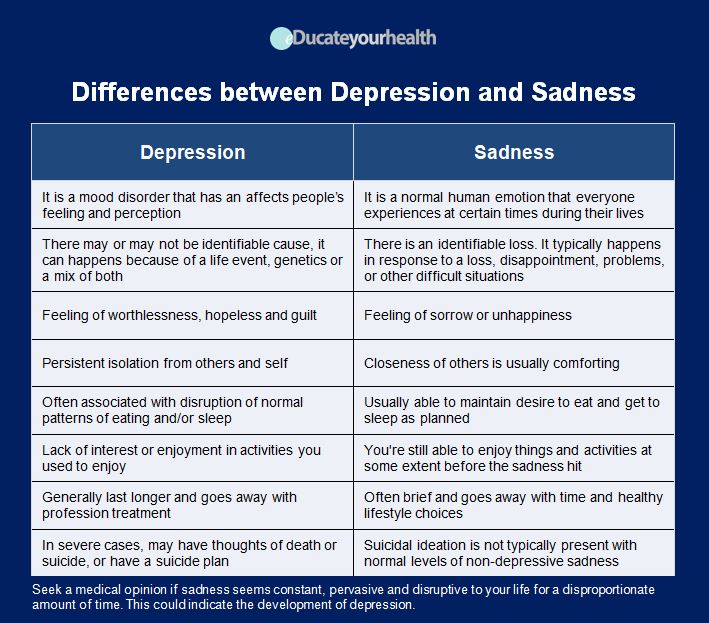Depression
Definition and Causes:
DEFINITION:
A condition of a persistent feeling of sadness and/or loss of interest in activities that one previously enjoyed. It may occur for a short or long period of time, with varying degrees of intensity and is different from normal feelings of sadness, grief, or low energy.
CAUSES:
Depression may result from various factors in a person’s life, including:
- Personal trauma
- Work stress/ job loss
- Family/ friend Illness or death
- Social isolation
- Abuse or neglect
- Weather/ seasonal changes (reduced exposure to sunlight)
- Under-active thyroid gland (hypothyroidism)
- Sleeping problems
- Family history of depression
- Certain medicines, such as steroid
- Chronic pain
- History of traumatic experiences
Symptoms:
Symptoms must last at least two weeks for a diagnosis of depression to be considered.
- Low energy, slowed movement
- Lack of interest in typically enjoyed activities
- Changes in appetite — weight loss or gain unrelated to dieting
- Trouble sleeping or excess sleeping
- Feeling sad or having a depressed mood
- Excessive sleeping or insomnia
- Difficultly concentrating on tasks or making decisions
- Memory problems
- Feelings of guilt and low self-worth
- Frequent thoughts of death and/ or suicide
 Investigations and Treatment:
Investigations and Treatment:
INVESTIGATION:
- Psychological evaluation: A Doctor may enquire about patient’s history, current situation and medication use, to determine a possible cause for depression. Feelings, emotions and thoughts will be discussed
- Laboratory tests: Blood test and other laboratory tests may be conducted to rule out conditions with similar symptoms to depression
- Physical exam: Non-invasive basic examination of heart, lungs, blood pressure and temperature
TREATMENT:
There are various ways to treat Depression. Antidepressant medications and psychotherapy may be used individually or in combination. Lifestyle changes, such as getting more exercise, also may help.
The most commonly used treatments are:
- Life style
- Medications
- Psychotherapy
- Brain stimulation therapies
a) Life style:
- Exercise: Regular exercise even a half-hour daily walk can make a big difference
- Social support: Avoidance of isolation, as this is a key risk factor for depression
- Nutrition: Eating regular well-balanced meals is important for both physical and mental health
- Sleep: Sleep has a strong effect on mood. Depression worsens with insufficient or disrupted sleep
- Stress reduction: Make changes in your life to help manage and reduce stress
b) Medication:
Antidepressants medications may bring about improvement within the first two weeks of use but in general full benefits may not be seen for 8-12 weeks. There are many different types of antidepressants available.
- Selective serotonin reuptake inhibitors (SSRIs): Such as citalopram (Celexa), escitalopram (Lexapro), fluoxetine (Prozac), paroxetine (Paxil), sertraline (Zoloft) and vilazodone (Viibryd)
- Serotonin-norepinephrine reuptake inhibitors (SNRIs): Such as duloxetine (Cymbalta), venlafaxine (Effexor XR), desvenlafaxine (Pristiq, Khedezla) and levomilnacipran (Fetzima)
- Tricyclic antidepressants: Such as imipramine (Tofranil), nortriptyline (Pamelor), amitriptyline, doxepin, trimipramine (Surmontil), desipramine (Norpramin) and protriptyline (Vivactil)
- Monoamine oxidase inhibitors (MAOIs): ): Such as phenelzine (Nardil), and tranylcypromine (Parnate), isocarboxazid (Marplan) and Selegiline (Emsam), used as a skin patch
- Norepinephrine and dopamine reuptake inhibitors (NDRIs): ): Such as bupropion (Wellbutrin)
- Non-competitive N-methyl-D-aspartate receptor antagonist: Esketamine (Ketanest, Spravato)
c) Psychotherapy:
Also known as talk therapy or psychological therapy, focuses on strategies to help improve the ways to manage personal stress issues. Psychotherapy models include:
- Cognitive-behavioural therapy (CBT)
- Interpersonal therapy (IPT)
- Psychodynamic therapy
- Dialectical behaviour therapy (DBT)
- Solution-focused therapy
d) Brain stimulation therapies:
- Electroconvulsive therapy (ECT)
- Transcranial magnetic stimulation (TMS)
- Vagus nerve stimulation (VNS)
Risk Factors and Prevention:
RISK FACTORS:
- Family history of depression
- Family history of alcoholism and/or drug abuse
- Female gender
- Traumatic experiences as a child
- Stressful life/job/school
- Having recently given birth (postpartum depression)
- Alcohol/ drug abuse
- Side effects of some medications
- Social problems
PREVENTION:
- Get help early specially after a traumatic or disturbing experience
- Adequate rest and sleep
- Well-balance meals/ diet
- Avoiding alcohol and other drugs
- Exercise regularly
- Reduce or quit caffeine consumption (coffee, tea, cola and chocolate)
- Seeking help to deal with social problems
- Practicing stress relief techniques
- Identify and avoid potential triggers associated with the onset of their depression symptoms
Outcome:
Early treatment is important, since depression can worsen without treatment, and can lead to increased risk of suicide and development of other diseases, including dementia
- Depression is among the most treatable of mental disorders
- About 80—90% of people with depression eventually respond well to treatment
- Almost all patients gain some relief from their symptoms
- Some individuals may need to take medications indefinitely in order to enjoy a full and happy life
[bellows config_id=”main” menu=”114″]
Receive latest COVID-19 News
[wd_hustle id=”Fronttobeusedonwhitebackgrounds” type=”embedded”/]
Follow us
